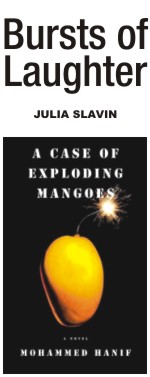|
Book Review

You may have heard the story about Henry Kissinger's meeting with Zhou Enlai: The secretary of state asked the legendary Chinese diplomat for his assessment of the French Revolution. "Too soon to tell," Zhou replied.
History, no doubt, takes the long view, an observation borne out by Mohammed Hanif's insanely brilliant, satirical first novel, based on suspicious circumstances that led to the 1988 plane crash that killed Pakistani President Mohammed Zia ul-Haq and U.S. Ambassador Arnold Raphel. "A Case of Exploding Mangoes" was already in production when former Pakistani prime minister Benazir Bhutto was assassinated in Rawalpindi. And even now as he lawyers' movement continues to pressure the crumbling presidency of Pervez Musharraf, Pakistan continues to write new history. It took courage for Hanif to put anything in print about a country that's changing by the minute, but "A Case of Exploding Mangoes" is as familiar and relevant this hour as any.
At the core is Ali Shigri, a do-or-die air force pilot who, to avenge the covered-up murder of his father, conspires to kill Zia, the dictator who overthrew and later executed Prime Minister Zulfiqar Ali Bhutto. Enlisting the help of his barracks mate and lover, Obaid, a hash-dealing laundryman and a hash-smoking CIA operative, Shigri sets out to kill the president. But he has to get in line behind a host of Zia's would-be assassins. Shigri's poison-tipped sword seems positively old-school next to the chief of intelligence's plan to release poison gas into the ventilation system of Zia's plane.
If rage is the mother's milk of satire, then Hanif has plenty. He takes out his fury on a hapless President Zia, plaguing him with worms, a seemingly eternal rectal examination and a longing for Caucasian cleavage. Eventually, Zia is reduced to nothing more than an outgrowth of his mustache, which Hanif has imbued with near-human properties. When we first meet Zia, he has become so victimized by his own paranoia that he has locked himself in the palace, passing his time interpreting the Koran as a daily horoscope.
But perhaps nothing frightens him as much as the first lady, who, after discovering a damning photo of her husband leering at the breasts of a Texas reporter, has vowed to turn her back on him forever. As if he didn't have enough problems, he is now under pressure from human rights groups to release a blind woman accused of fornication (she was raped by four men) and condemned to death by stoning. He turns to his spiritual adviser, who keeps a flat in Mecca. The stoning must go forward, he's advised. The Doctrine of Necessity, the same law that justified overthrowing the Bhutto government, will be employed. "The guilty commit the crime," Hanif writes. "The innocent are punished. That's the world we live in."
When Hanif plays the book for comedy, he scores. Take, for example, a party at the U.S. Embassy at which strange bedfellows show up as if attending a Rotarian costume ball. "The local CIA chief, Chuck Coogan, one of the first guests to arrive, sported a Karakul cap, and an embroidered leather holster. . . . The U.S. cultural attaché came wearing an Afghan burka, one of those flowing shuttlecocks that she had tucked halfway over her head to reveal the plunging neckline." When a military bouncer objects to the epaulet on a University of Nebraska professor's camouflage outfit, the guest shrugs, "Well, we are at war. Ain't we?" In walks "a lanky man with a flowing beard" named OBL -- think about it -- who quickly tires of an uninterested reporter and moves on to the next guest. "How's business, brother?" Gen. Akhtar, chief of Pakistan intelligence, asks after thanking him for his help in booting the Soviets. "There is no business like the construction business in times of war," OBL replies. The role is only a cameo. Hanif doesn't need to tie loose ends; we have history for that.
But even as Hanif eviscerates, he writes with great generosity and depth. And perhaps he is at his best when he describes the relationship between Shigri and Obaid. Released from prison where they were tortured for information on their assassination plot, the two retreat to Shigri's boyhood mango-farm home. Obaid admits that under torture (his head was ironed) he gave up Shigri and his plan to kill the president. Shigri has done the same to Obaid. Still, the bond between the two endures, defying their mutual betrayal.
Hanif shifts points of view seamlessly, from Shigri to Zia, from Gen. Akhtar to the blind condemned woman, from Ambassador Raphel to his wife. There's even a mango-eating bird that makes a foreboding wrong turn at the border of Pakistan and Afghanistan and an appearance by former CIA Chief Bill Casey, portrayed as an airplane-racing drunk.
Hanif graduated from the Pakistan Air Force Academy, which gives this military farce a firm grounding. "A Case of Exploding Mangoes" belongs in a tradition that includes "Catch-22," but it also calls to mind the biting comedy of Philip Roth, the magical realism of Salman Rushdie and the feverish nightmares of Kafka. But trying to compare his work to his predecessors is like trying to compare apples to, well, mangoes, because Hanif has his own story to tell, one that defies expectations at every turn.
This review first appeared in The Washington Post.
Copyright
(R) thedailystar.net 2008 |
